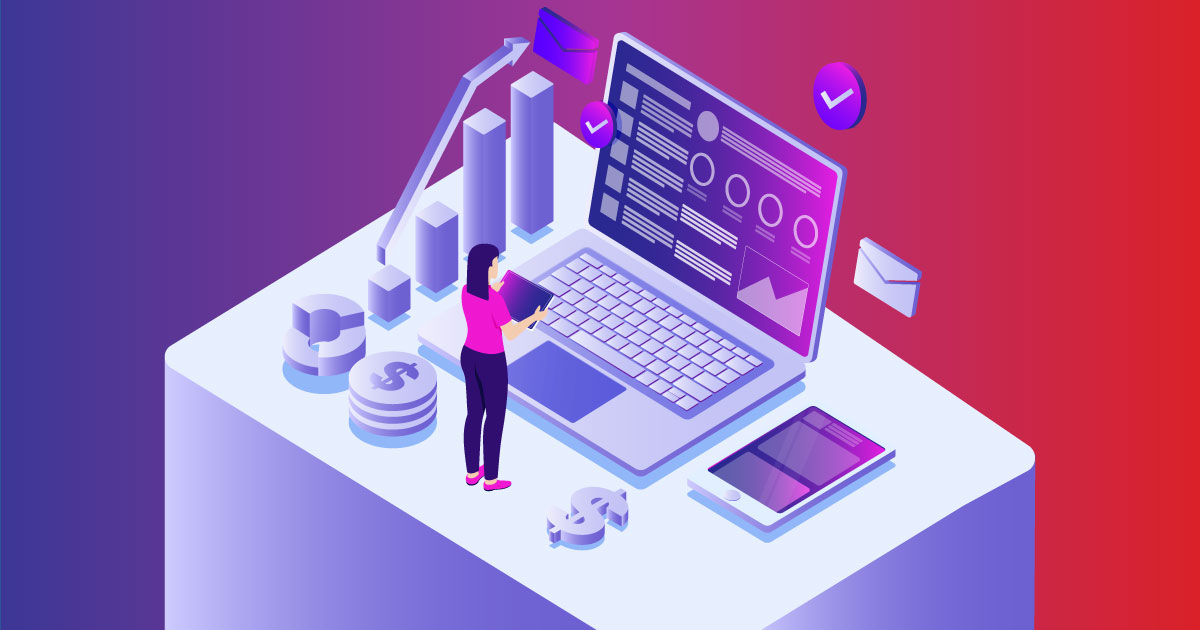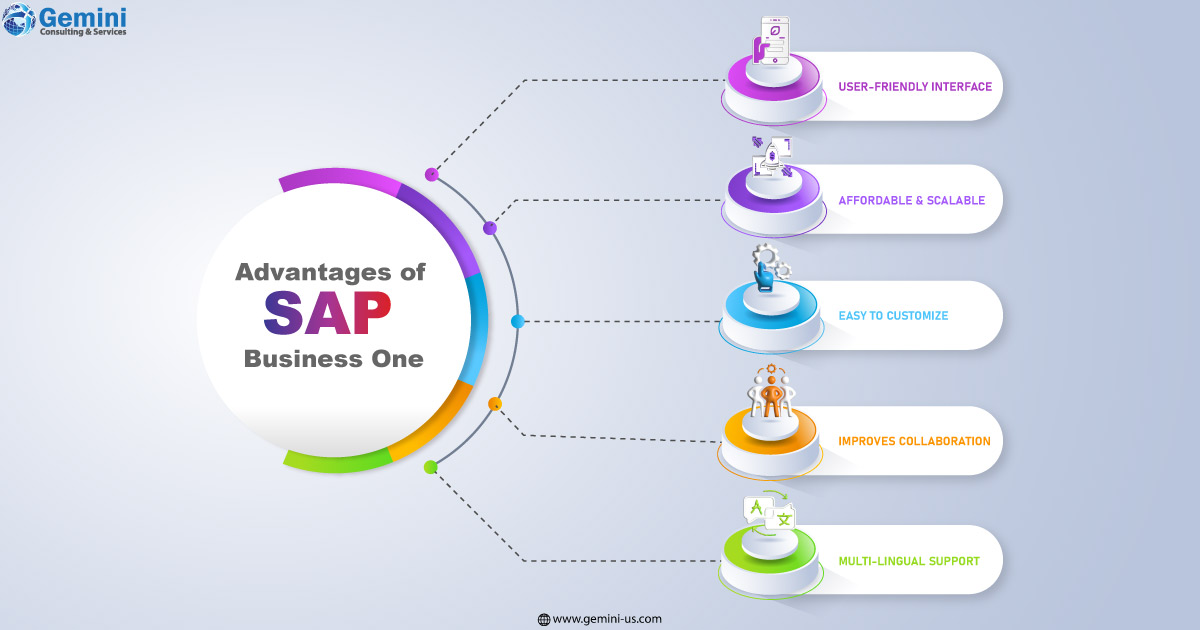Modern enterprises have complex, interrelated business divisions and operations. Many of them cannot be separated and managed without understanding the business model. For instance, if the accounting process needs to be streamlined, it is essential that the financials and inventory operations are sorted and kept in order.
A robust ERP solution can help an enterprise to understand the correlation between various business functions, minimize duplications, enhance productivity and save time and money in the long run. However, investing in an ERP needs to be a carefully thought-out exercise. Businesses must consider and analyze the pros and cons of popular ERP applications to choose what suits their requirements.

Let us analyze the features and benefits of two widely used ERP solutions in the market.
SAP is undoubtedly a pioneer in ERP software. It provides advanced, feature-rich ERP solutions for Small and Medium-sized Enterprises (SMEs). SAP Business One (B1) is a cloud-based ERP solution that can handle the complex and unique needs of businesses.
NetSuite on the other hand was acquired by Oracle in 2016. Initially, it was accounting software and later expanded to include core business areas including supply chain management, procurement, finance, and order management. Both Oracle NetSuite and SAP have a strong network of global partners and embrace several third-party integrations for different functions.
SAP Business One modules are designed to handle specific functions exclusively spreading over Customer Relationship Management (CRM), sales, purchasing, inventory, financials, resources, and project management.
NetSuite also offers custom platforms such as CRM, eCommerce, and financials/ERP. However, it is different from SAP B1 which offers everything on one platform. NetSuite has three different platforms. Enterprises, therefore, need to clearly evaluate their business objectives before opting for the NetSuite platform. It could become cumbersome for growing small and mid-sized businesses.
SAP Vs. NetSuite
Category | SAP | NetSuite |
| Upgrade and innovation | Regular updates with innovative features help businesses drive growth without hitches. | Driven by countless add-ons developed and supported by third parties. They follow different design standards and lack uniformity when compared to SAP. |
| Deployment | More flexible during deployment and upgrade. Hence business continuity is maintained if there is a forced upgrade | Deployed within a multi-tenancy. System upgrades deploy at NetSuite’s discretion only. |
| Personalization | The new Fiori dashboard is easy-to-use and offers a high level of personalized experience. | Dashboard has limited functions and customization of reports is cumbersome. |
| Migration | Easy to move into S/4HANA | Expensive and risky. |
SAP B1 certainly has more advantages over Oracle NetSuite since it is cloud-based, flexible, and offers more control. It provides various modules under a single platform. Gemini Consulting & Services has a team of expert professionals who can assist your enterprise in deploying SAP B1. Contact us to know the benefits offered by SAP B1 and how you can improve your business efficiency.
Let us discuss some of the key points in detail.
Processes maybe be shifted completely into the cloud, and some operations may still be kept on-premise in the case of SAP B1. It extends the facility of planning cloud upgrades with changes in business models to corporate users. The solution just needs to be installed on hardware/servers and can be easily managed afterwards.
NetSuite, on the other hand, is a completely cloud-based solution offering lesser value for money or flexibility in deployment.
SAP Business One Cloud comes with Amazon Web Services (AWS) and can easily scale up with business growth. It gives real-time insights across functions, thereby, helping entrepreneurs to make informed decisions from anywhere. Business owners can obtain a high Return on Investment (ROI) in a relatively short time with SAP Business One implementation as its price is just right for SMEs.
The NetSuite starter edition has limited features. Depending on business requirements, enterprises need to purchase additional features as add-ons. For instance, the NetSuite starter edition comes with some financial features, but basic CRM features are absent. These additional purchases drive up the overall cost.
There are multiple SAP partners who offer customized implementations to meet diverse business requirements. There are add-on options also that help meet specific needs.
Since Oracle NetSuite opts for outsourcing direct implementation, it has challenges such as scheduling meetings with offshore resources, etc. It follows a fixed implementation fee structure. Hence enterprises need to keep a close tab on commitment/timing.
SAP Business One is licensed only through authorized resellers and offers several options as per the size/scale of a business. However, it is possible for businesses to obtain assistance from a dedicated SAP partner along with the license. The license of Oracle NetSuite on the other hand can be obtained through both resellers and the sales team of NetSuite. The complex licensing model of NetSuite makes it more expensive. An SAP B1 license can be easily obtained based on the number of users.
Easy accessibility plays a vital role in improving customer services and bringing down operational expenses. SAP Business One stores data in the cloud and in multiple data centers resulting in high accessibility. Further, SAP Business One helps obtain analytics on the platform itself. In the case of NetSuite, information needs to be gathered separately and data needs to be merged before the analytics program is run.

SAP Business One remains popular among SMEs as it has a user-friendly interface. It is affordable, scalable, and easy to customize. The application is built for growth and helps enterprises gain an edge over the competition with its intuitive features that can be easily customized to suit business needs. It helps resolve the complexities of growing businesses by providing real-time reporting and analytics.
SAP B1 drives better collaboration and keeps users abreast of all relevant activities occurring across functions thanks to flawless cross-departmental integration. It results in better collaboration, greater visibility, and higher productivity. It provides real-time updates on inventory management, orders, auditing, supply chain management, etc.
SAP B1 is an end-to-end integrated platform providing more features than Oracle NetSuite.
SAP Business One has all the necessary modules to provide industry-specific solutions. These offerings can be customized by a reliable SAP partner as per business needs. SAP B1 provides multi-lingual support across various geographies. Hence businesses can obtain analytics based on the region where the business is located.
NetSuite is less customizable than SAP Business One, the configuration cannot be changed and, on most occasions, a special edition of NetSuite may need to be purchased.



